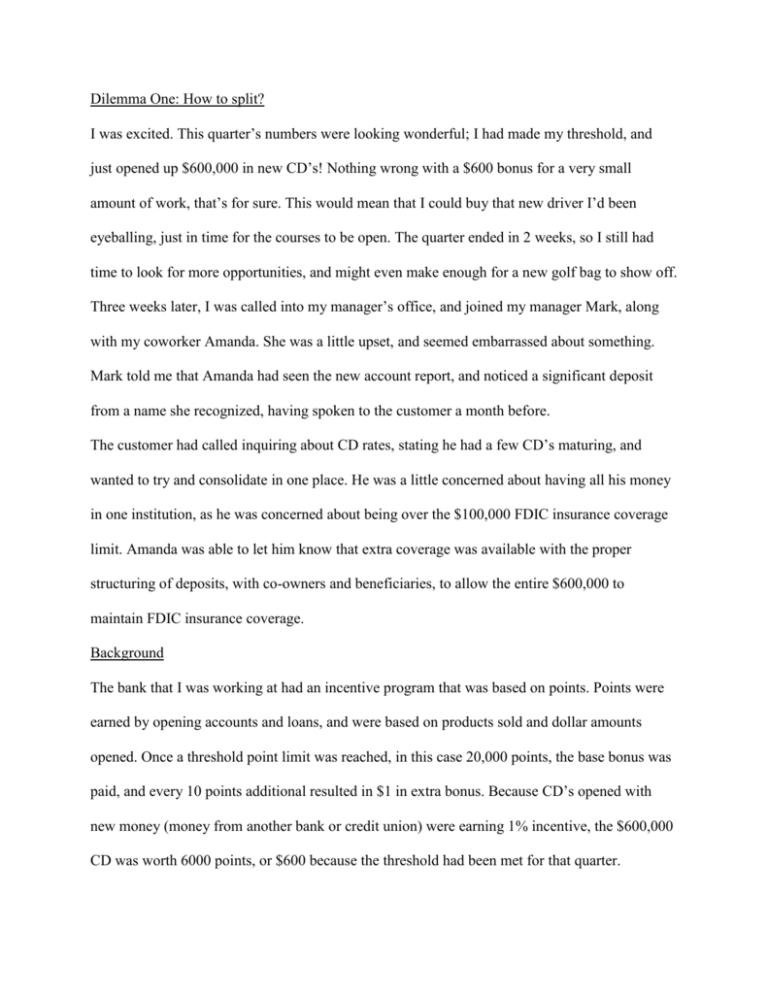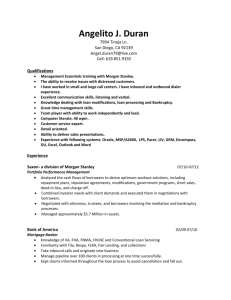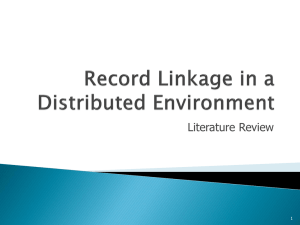Ethics Dilemma 9
advertisement

Dilemma One: How to split? I was excited. This quarter’s numbers were looking wonderful; I had made my threshold, and just opened up $600,000 in new CD’s! Nothing wrong with a $600 bonus for a very small amount of work, that’s for sure. This would mean that I could buy that new driver I’d been eyeballing, just in time for the courses to be open. The quarter ended in 2 weeks, so I still had time to look for more opportunities, and might even make enough for a new golf bag to show off. Three weeks later, I was called into my manager’s office, and joined my manager Mark, along with my coworker Amanda. She was a little upset, and seemed embarrassed about something. Mark told me that Amanda had seen the new account report, and noticed a significant deposit from a name she recognized, having spoken to the customer a month before. The customer had called inquiring about CD rates, stating he had a few CD’s maturing, and wanted to try and consolidate in one place. He was a little concerned about having all his money in one institution, as he was concerned about being over the $100,000 FDIC insurance coverage limit. Amanda was able to let him know that extra coverage was available with the proper structuring of deposits, with co-owners and beneficiaries, to allow the entire $600,000 to maintain FDIC insurance coverage. Background The bank that I was working at had an incentive program that was based on points. Points were earned by opening accounts and loans, and were based on products sold and dollar amounts opened. Once a threshold point limit was reached, in this case 20,000 points, the base bonus was paid, and every 10 points additional resulted in $1 in extra bonus. Because CD’s opened with new money (money from another bank or credit union) were earning 1% incentive, the $600,000 CD was worth 6000 points, or $600 because the threshold had been met for that quarter. The bank itself was a community bank, with a very low turnover rate. The new accounts representatives were all very experienced, and had worked together for years. We were friends outside the bank as well, and often went out after the bonuses were paid and treated the tellers and others who had helped us reach our goals to dinner and drinks. I had a huge amount of respect for Amanda, and respected the fact that she had already spoken to this new customer, and had actually told him to come in and see her when he was ready to open the new account. The fact that he didn’t ask for her specifically wasn’t my fault, and I had done all the actual work in opening the CD’s. There wasn’t a lot of work to open a new customer account, but it was certainly longer than the phone call Amanda had shared had taken! Mark and Amanda recognized the relative amount of work that each of us had done, and Amanda was wondering if I would be willing to consider splitting the bonus for that customer with her. She’d spoken to him, but I’d done the actual work on the accounts. What should I do at this point? Business Dilemma Two: Missing Mortgage I was in the process of renewing the Home Equity Line of Credit for Mrs. Johnson. I was struggling a little bit with the file, as her income was much lower than when we had originally done the loan. Mrs. Johnson had a home with a decent amount of equity on Island Lake, but had lost her husband, and his income, a few years before. It’s our practice to renew loans in these circumstances if the customer feels they can continue on making payments, as we’d really rather avoid taking a home from an owner if at all possible. Neither the bank nor the owner wins in those circumstances. We had spoken a couple of times during the renewal process, and she was confident she could continue to budget for our payment in addition to the first mortgage and all her credit card bills. I was in the process of verifying value, income, and liens against the property, when I noticed that there was no other lien against her house other than ours! There was no first mortgage showing on the paperwork, yet I knew there was one on the credit bureau. What was going on? I called Mrs. Johnson to ask if she’d be able to recently pay it off, and perhaps it didn’t reflect on the credit report yet. She told me she hadn’t, and seemed puzzled herself. Background Mrs. Johnson lived on Island Lake, specifically on a parcel that was owned by Minnesota Power, and leased from them. People who lived on these properties only had rights to the personal property, not the actual real estate. These “Leased Land” leases spelled out the fact that everything was considered personal property, including any structures on the land, and that the homeowners had no legal right to the actual land itself. It’s a specialized type of property arrangement that the lenders in the area were familiar with, and comfortable with, but most outside, national bank lenders didn’t understand the nuances of. For that reason, it’s been impossible to get a traditional, “secondary-market” type of mortgage. Property like this didn’t actually get a Mortgage filed against it, as most people are familiar with, but rather a UCC Filing (Uniform Commercial Code) was done against all the personal property on the leased land, and that served as the security for a loan. The twist about UCC filings is that they have to be renewed every 5 years, which is a very easy, automated process, as long as the lender knows what it is and how to do it. Apparently Mrs. Johnson had obtained traditional, secondary-market financing 8 years or so ago, when lenders were hungry for new loans, and willing to be a bit more relaxed on lien requirements. The loan had subsequently been sold, and the new lender didn’t know about renewing the lien. Mrs. Johnson had become an unsecured borrower with her mortgage company! If they re-filed a new UCC against the property, they would again be secured, but now be in a second lien position behind our loan. I spoke to her about this briefly when I renewed the loan with her, but got a call from her a couple weeks later. She asked me what would happen if she sold her home. I explained the title company would verify liens, and contact the lenders for payoffs. She reminded me about the fact that there was no first mortgage lien filed, and asked what would happen to them. I told her they wouldn’t get paid from the proceeds of the sale, but that she would legally still owe them the money. She then asked about the implications of filing bankruptcy, and I could see she was planning on leaving the mortgage company holding the bag! I explained that she should speak to an attorney, and that she was asking legal advice I couldn’t provide. Moving forward 6 weeks, I was contacted by a title company, asking about a payoff for our loan. I sent the requested information, and asked if there was another lien against the property. The title agent wasn’t aware of one, so I dropped it. Now I knew that Mrs. Johnson was planning on selling the home, and leaving the mortgage company with an unsecured debt, which would be charged off when she declared bankruptcy. I had time to contact the first mortgagee, and they could file their lien online in minutes, if I could actually get in touch with someone who would understand. What should I do at this point? What Actually Happened? Dilemma One-I gave Amanda the entire amount of points for the CD’s, rather than splitting it with her. Not only was she a friend, but we were both professionals. She had specifically asked the customer to come find her, and he hadn’t done so. While I had done the actual work to open the CD’s, it was only a few minutes of time, and it wasn’t really the point. The only reason that customer came in to open CD’s for that large of an amount was due to the fact that Amanda had done her job properly, asked the right questions, and figured out how to make the customer happy while adding value to our bank. He was her customer, and she deserved then entire bonus. Dilemma Two- I didn’t make any attempt to contact the other lender. I didn’t feel it was my responsibility to make sure that they were doing the job that they were supposed to do, as they hadn’t done their due diligence when purchasing the loan. Mrs. Johnson sold her home, declared bankruptcy a few weeks later, and was able to keep all the proceeds of her home under the homestead exemption of the bankruptcy code. While it was a large amount of money, she didn’t have any other funds to live off of, and would still be struggling to pay for an apartment and other basics for the rest of her life. Summary From the first dilemma, once I had made the decision to just give Amanda then entire bonus, I immediately felt it was the right decision. I knew she would’ve been just fine if I’d offered to split it, as she had recognized the fact that I had done some work on the account too, and that I deserved something for having done so. However, it wasn’t the money, but the respect that was worth more to me. I knew that both Amanda and my manager would recognize the sacrifice, and future situations would be dealt with in the same respectful manner. As far as the second situation went, I did feel a bit bad for the lender, but also realized that my first loyalty was to my employer, and my second, to my customer. She’d made the decision to declare bankruptcy, not me. The fact that she was elderly, and would still struggle even with the unexpected windfall might have influenced me a bit, however, I don’t believe I would’ve done anything different if she had been 40 years younger. If I’d contact the other lender, the sale might’ve fallen through, and we might’ve had issues with the loan going forward. My loyalties required that I just do my job, and that doesn’t include baby-sitting mortgage companies who didn’t do their homework.








